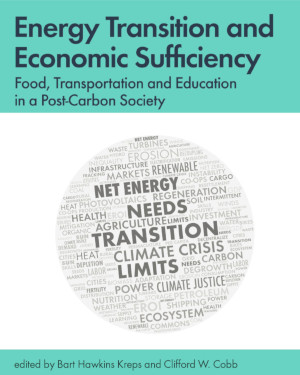
Energy Transition and Economic Sufficiency: Food, Transportation and Education in a Post-Carbon Society
Bart Hawkins Kreps Clifford W. Cobb
November 8, 2021
Will the winding down of fossil-fuel consumption lead to radical changes in our lives? Or can we turn away from the climate crisis cliff while the industrial economy just keeps growing?
Renewable energy sources have powered civilizations for nearly all of history and must do so again. But usable energy will become a more precious resource, as it was before our brief, explosive binge on the most easily accessible fossil fuels. In coming years we will have to recognize when “enough is enough.” Sufficiency, not growth, needs to be the focus of the new economy.
The authors of this volume discuss changes in food production and distribution, urbanization and rural revitalization, cargo transportation, energy generation, law, and education. They show how many aspects of contemporary technology, plus lessons from our long history, can help us in the “sufficient economy” of the future.
Renewable energies will not save our always-on, constantly growing, high-energy economy. But if we share the wealth to produce what we really need, renewable energies can power a sustainable civilization.
(The essays in this book were originally published by John Wiley & Sons in The American Journal of Economics and Sociology vol. 79 no. 3, May 2020, and are republished with permission by Post Carbon Institute.)
Read
Buy in paperback:
- Amazon.com (US) | Amazon.ca (Canada)
- Bookshop.org (US) Support local bookstores!
- Waterstones (UK)
- Booktopia (Australia)
Reviews
For decades, we have dealt with energy consumption and carbon emissions by increasing efficiency; the result was bigger pickup trucks, cheaper flights, and rising carbon emissions. The contributors to this volume explain why it is time to stop thinking so much about efficiency and start thinking about sufficiency. They describe a future that is not just sustainable but is regenerative, and where there is enough for everyone living in a low-carbon world.
– Lloyd Alter, Design Editor at treehugger.com, Contract Lecturer at Ryerson University, and author of Living the 1.5 Degree Lifestyle: Why Individual Climate Action Matters More Than Ever
Energy descent is crucial to stopping climate and ecological breakdown, both by greatly reducing the magnitude of transition and by increasing the odds that it is a just transition. This is a key conversation to have as we lurch toward ecological civilization.
– Peter Kalmus, climate scientist, author of Being the Change: Live Well and Spark a Climate Revolution
This lively and insightful collection is highly significant for identifying key trends in transitioning to low-energy futures. Cutting carbon-emitting activities will drive economies towards de-urbanisation. Using less, and renewable, energy will turn current relations between agricultural and high tech sectors upside down. Goods produced locally or moved by wind-powered ships and cargo bikes, solar commons, regenerative organic agriculture and consumer food cooperatives are all critically and acutely analysed as practical solutions to the twin challenges of energy descent and climate change.
– Anitra Nelson, author of Small is Necessary: Shared Living on a Shared Planet, co-author of Exploring Degrowth: A Critical Guide
Whether as a result of climate action or fossil fuel depletion, our future will almost certainly be shaped by energy scarcity. However, very few policy makers or academics are preparing for, or thinking about, life with less energy. Cheap, abundant energy gave us the industrial food system, consumerism, and a growing middle class. Might we see that gravy train reverse itself? The contributors to this volume have done us all a tremendous service by surveying the terrain ahead and by identifying the easiest and best low-energy paths to a survivable, sustainable future.
– Richard Heinberg, Senior Fellow, Post Carbon Institute, author of Power: Limits and Prospects for Human Survival
For those already applying permaculture in their lives and livelihoods, this collection of essays is affirmation that we are on the right track for creative adaption to a world of less.
This book helps fill the conceptual black hole that still prevails in academia, media, business and politics about how a world of less is inevitable. For those articulating “energy descent” futures; whether to friends, colleagues, teachers, students, employees, policy makers or political representatives, this collection by writers across a range of fields helps paint the picture of how a world of less is possible by design rather than collapse.
– David Holmgren, co-originator of Permaculture, author of RetroSuburbia
Contents and Contributors
1. Editors’ Introduction – Bart Hawkins Kreps and Clifford W. Cobb
Part I: The Major Challenges: Climate Change and Energy Descent
2. Adaptation and Mitigation Amid the Consequences of Failure – Paul Cox and Stan Cox
3. The Rising Costs of Fossil Fuel Extraction: An Energy Crisis That Will Not Go Away – Bart Hawkins Kreps
4. Energy Sprawl in the Renewable-Energy Sector: Moving to Sufficiency in a Post-Growth Era – Bart Hawkins Kreps
Part II: How Will We Feed Ourselves?
5. The Future is Rural: Societal Adaptation to Energy Descent – Jason C. Bradford
6. Why Regenerative Agriculture? – Courtney White
7. Differing Visions of Agriculture: Industrial-Chemical vs. Small Farm and Urban Organic Production – Heather Gray and K. Rashid Nuri
8. Consumer Food Co-ops in the Age of Grocery Giants – Jon Steinman
Part III: Generation, Transportation and Education
9. Reorienting the Economy to the Rhythms of Nature: Learning to Live with Intermittent Energy Supply – Kris De Decker
10. Suburban Practices of Energy Descent – Samuel Alexander and Brendan Gleeson
11. What Makes a Good Cargo Bike Route? Perspectives from Users and Planners – George Liu, Samuel Nello-Deakin, Marco te Brömmelstroet, and Yuki Yamamoto
12. Winds of Trade: Passage to Zero-Emission Shipping – Nicola Cutcher
13. Energy-Transition Education in a Power Systems Journey: Making the Invisible Visible and Actionable – Jonee Kulman Brigham and Paul Imbertson
14. Solar Commons: A “Commons Option” for the 21st Century – Kathryn Milun
